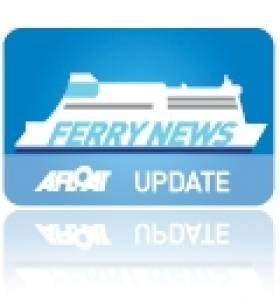Displaying items by tag: Irish Sea ferry travel disruption
Bad Weather Continues to Disrupt Ferry Sailings
#FERRIES - As the adverse weather continues, ferry services across the Irish Sea remain affected, with several crossings cancelled, writes Jehan Ashmore.
Irish Ferries 08.05hrs sailing this morning from Dublin to Holyhead operated by Isle of Inishmore, departed over three hours later than her scheduled time.
Last night she had just been deployed on the route so to cover sailings usually operated by Ulysses, which went off-service for annual dry-docking at Cammell Laird, Birkenhead, as previously reported on Afloat.ie
In addition the fast-ferry craft sailing at 08.45hrs from Dublin Port served by the Jonathan Swift were cancelled and the following sailings are also cancelled:
Dublin -Holyhead 14.30hrs
Holyhead-Dublin 12.00hrs AND 17.15hrs
Passengers booked on the Jonathan Swift instead will be accommodated on the Isle of Inishmore. For further information on Dublin-Holyhead sailing updates click HERE.
On the Rosslare-Pembroke Dock service, sailings were too cancelled with last night's sailing from Wales, which are currently served by Oscar Wilde. She sailed as scheduled with this morning's 08.45hrs sailing to Pembroke Dock.
To keep updated on Rosslare-Pembroke Dock sailings click HERE.
For further information, Irish Ferries Central Reservations contact: 0818 300 400 and for Irish Ferries, Rosslare Harbour contact: 00353 53 9133158
STENA LINE
For information on sailing schedules and updates from the company's Ferrycheck facility click HERE.
To contact Stena Line call: 003531 204 77 99 when travelling to Britain or 0044 (0) 8705 755 755 when travelling to Ireland or Scotland
P&O FERRIES
Dublin to Liverpool sailing at 1500hrs is cancelled and passengers will be accommodated on either 2130hrs tonight or 0900hrs on Friday 6th January.
For other sailings and on the Larne-Cairnryan click HERE and to contact +44 (0) 871 66 44 777 if calling from UK
OR (01) 407 34 34 if calling from ROI. In addition to latest sailing infomation on +44 (0)845 832 8888
FOR OTHER FERRY OPERATORS
Please click this LINK and choose the relevant highlighted ferry route for further information.





























































